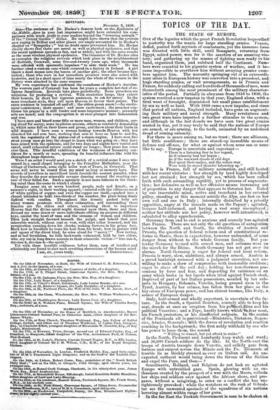ItEYIVAXS:
November 3, 1859.
Sin—The reviewer:of Dr. Hecker's famous. book on tha Bpidemies of i4e _Middle Agee in your last impression might have extended his com- parisons with much profit to your readers beyond the " towering untruth " of the " Covent Garden" divine. He might have shown that the-revivals now raging in Belfast and other places are amply accounted for in Heeker's chapter on "Sympathy ; " but no doubt space, prevented him. Dr. Hecker clearly shows that there are moral as well as physical epidemics, and that the moral epidemic spreads as fast, and as widely, and with the same results as the most virulent physical epidemics. The translator of Dr. Hecker cites as examples the religious revivals which took place in the neighbourhood of Redruth, Cornwall, some five-and-twenty years ago, when thousands were affected with spasmodic: impulses " to save their souls." He has further cited a curious case which occurred in a factory in Ireland. A girl threw a dead mouse into the bosom of another girl; the other became hys- terical ; those who were in her immediate presence were also seized with hysterics, and in a short space of time nearly the whole of the women in the- factory were attacked in the same manner. My own experience has -confirmed the.soundness of Hecker's doctrine. The western part of Cornwall has been for years a complete hot-bed of re- ligious fanaticism. Revivals take place periodically., Some preachers are notorious for producing a revivaL With stentorian lungs, they exhort their hearers, in short but vigorous sentences, to ask for mercy. In the same trenchant style, they call upon Heaven to favour their prayer. The same sentence is- repeated oft and oft ; the elders groan amen!—the excite- ment commences ; more amens ! and more excitement; the preacher con- tinues his prayer in a still louder and more impressive manner ; presently sobs are heard, and the congregation is at once plunged into lamentation and woe.
I have seen and heard some fifty or more men, women, and children, cry- ing aloud for mercy, some in piteous accents, others as resolutely demanding it, whilst some fall on their knees and groan, and throw about their limbs in wild despair. I have seen a woman looking towards Heaven with her clenched fist and arm bare working that arm at least an hour to and fro, with the regularity of the piston-rod-of a steam-engine. I have seen fine stout young men go into the chapel to learn what was going on ; thev have been seized with the epidemic, and for two days and nights have ranted and raved, until'exhausted nature could stand no longer ; then peace has come over them. This dreadful exhibition of the weakness of humanity con- tinues for a month or more, spreading its baneful influence like wild fire throughout large districts.
Were I an artist I would send you a sketch of it revival scene_I once wit- nessed in a small chapel belonging to the Primitive Methodists, near the village of Carharrack, some eight miles west of Truro, in Cornwall. That scene will never be erased from my mind as long as memory lasts. The records of travellers in uncivilized lands furnishithe nearest parallel, when they describe the poor miserable savages dancing _around the roasting car- case of theirfallen foe. Such a spectacle isnot more hideous to the think- ing mind than the scene to.which I allude.. Imagine some six or seven hundred people, male and female, on a summer's night, in their working apparel;taxitted with the villanous smell of white pyrites of copper, and even thecopper ore- itself,--packed` lute a chapel intended to hold. two-thirds of the number, the place being dimly lighted with candles. Throughout this densely packed body are many women prostrate with sheer exhaustion, and surrounding these females are the elders and others, exhorting them to importune Heaven that the divine spirit might descend upon them, there and then. Around are some dozen-or more individuals offdring up prayers in different keys, amidst the howl of' men and the 'screams of women and children. Then look straight- forward beneath the pulpit, and behold that poor miserable wretch, .without coat or. vest, with shirt collar. loosened, and the perspiration running down his cheeks, making 'furrows in his grimy face. Mark how in handfuls he tears his hair from his head; how in gesture-wild and !wetly of the direst-kind, he cries aloud for "mercy !" Now raving, and at last breathless, he falls backwards. exhausted, held by two elders, who cry out in -long drawn accents to their miserable victim—" Drz-inn-k, drr-inn-k, drrinn-k---the spirit."
Yet with these horrible evidences before them, men of intellect and scholarship are found to abet such revolting aberrations of the human mind_


























 Previous page
Previous page